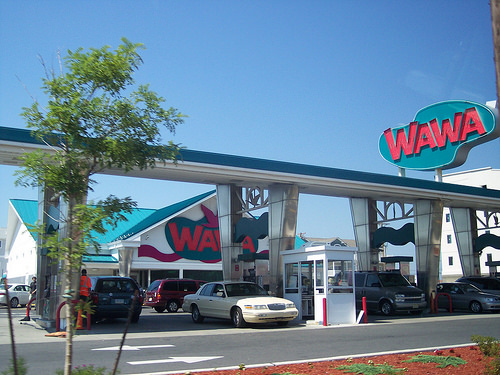Gas tax hike to hit New Jersey drivers
Within 24 hours after this year’s elections, a new bill in New Jersey proposed raising the state’s gas tax to almost $300 yearly for the average driver. The increased revenue will be put towards the state’s roadwork fund for fixing roads, rails and bridges, reports The Star-Ledger newspaper. The legislation, which was proposed by Assembly Transportation Committee Chairman John Wisniewski, would raise $1.25 billion each year.

Three years after promising to use “more cash and less debt” to pay his state’s fearsome transportation bills, and one day after an election, Chris Christie is finally delivering. From Minale Tattersfield.
The bill, reports Bloomberg, is the first one introduced since the chairman’s panel started holding hearings on how to bankroll the fund. The fund is projected to run out of cash and bonding authority next fiscal year. “We have to raise revenue,” Wisniewski, 52, a Democrat, told Bloomberg. “We can’t solve our transportation funding crisis by pretending there’s money someplace we haven’t tapped.”
One of the places the state’s politicians have already tapped: the Port Authority of New York and New Jersey. The Port Authority supplied a whopping $375 million just this year in funds which were originally intended for a rail project that was squashed in 2010 by New Jersey Governor Chris Christie. As The Star-Ledger wrote in an editorial earlier this year, “[t]he Port Authority has become a piggy bank that both governors rely on to finance pet projects with minimal accountability.” Legal or not, the Port Authority’s funds will also run out next year.
The new tax would amount to around 80 cents daily for the average New Jersey driver, or about $292 yearly based on per-capita fuel usage. As The Star-Ledger reports, the bill targets New Jersey’s “petroleum products gross receipts tax, now levied at a rate of 4 cents per gallon on wholesale purchases of gasoline by distributors at refineries. An annual minimum of $200 million of the proceeds of the petroleum tax is now constitutionally dedicated to the trust fund.” The new bill would raise the minimum to $1.45 billion.
The new law would also change the way the gas tax is calculated, charging distributors 9 percent of gas’ retail price. (Currently the gas tax is calculated on cents-per-gallon.) The result: a 25-cent increase, to 29 cents, based on the average price of gas this August, which was $3.30 per gallon. Drivers will be paying the tax, not distributors, reports The Star-Ledger, “because wholesale fuel taxes are routinely passed on to station owners, who will then pass them on to motorists in the price at the pump.”
New Jersey’s highway system has a few notable (dis)honors. It’s the nation’s priciest to operate and maintain, according to the Reason Foundation. Additionally, 66% of the state’s roads were in “poor or mediocre condition,” and 36% of its bridges were “structurally deficient or obsolete,” according to the American Society of Civil Engineers’ 2013 Report Card for America’s Infrastructure.
Christie, who had long refused to consider a gas tax, said in October that he would be open to all options for bankrolling the fund. (In 2011, Christie had promised to, Bloomberg reported last month, “use more cash and less debt” for highway expenses. “Instead, as state revenue came up short of forecasts, he put no money into the transportation fund for three years and borrowed $1 billion more than promised to keep it alive.”) Appointed by Christie, Wisniewski had not brought up the gas tax hike in detail prior to Nov. 4’s elections, though in a late September hearing, he talked about “a sustainable funding solution” for the fund, according to The Record newspaper.
New Jersey’s gas tax is the second lowest in the nation. The new bill wouldn’t adjust the state motor fuels tax, which is a 10.5 cent-per-gallon applied to retail purchases of gas at the pump. All of the revenue from that tax already goes to the fund.
Related Posts
Category: Legislation

















